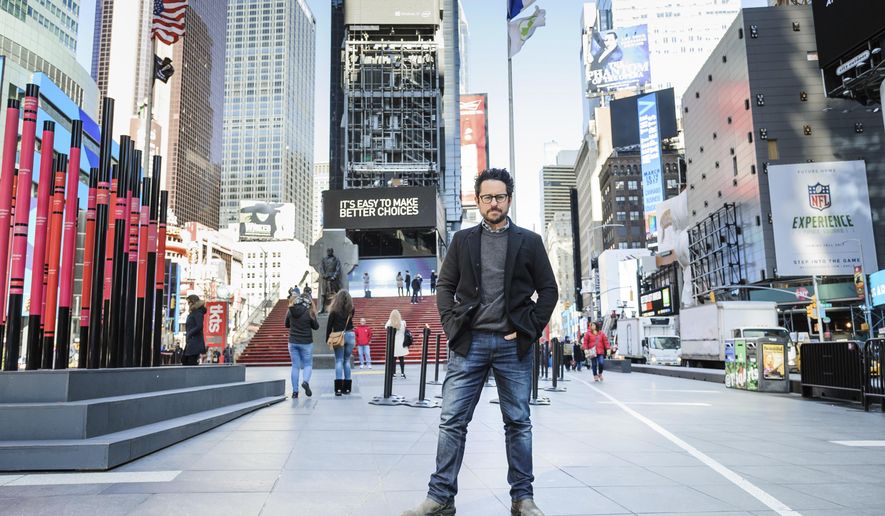NEW YORK (AP) - Seeking a break from green screens and lightsabers while shooting “The Force Awakens” outside London, J.J. Abrams decided to catch a play.
“I had a free night and looked to see what was playing,” Abrams recalled in a recent interview over a plate of pasta in Manhattan. “I saw something that was called ’The Play That Goes Wrong’ that sounded amusing. I bought a ticket and went knowing nothing. I’d never laughed that hard. I’d never seen an audience laugh that hard.”
That Abrams accidentally stumbled upon “The Play That Goes Wrong ” is fitting. It’s a work stuffed with stumbling and a 100-car pile-up’s worth of accidents.
And now, with Abrams as a producer, “The Play That Goes Wrong” has careened all the way to Broadway. Currently in previews, it will officially open April 2 at the Lyceum Theatre.
Though its name could double as a nickname for Julie Taymor’s ill-fated, mistake-prone “Spider-Man,” ’’The Play That Goes Wrong” is a madcap farce - ostensibly a 1920s murder mystery - in which lines are flubbed, entrances are poorly timed, actresses have a penchant for being knocked unconscious and not a single prop is ever where it ought to be. Some will certainly recall the backstage comedy “Noises Off,” but “The Play That Goes Wrong,” with the slapstick of Monty Python in its blood, cranks the chaos up to 11.
It marks the Broadway debut of an unusual pair. It’s the first professional step into theater for Abrams, the pre-eminent crafter of blockbuster science fiction and small-screen puzzles. And it’s also the Broadway entre for London’s Mischief Theatre. Kevin McCollum, the play’s other producer, calls the troupe - including artistic director Henry Lewis and company director Jonathan Sayer - “the comic Steppenwolf.”
Though the play ran for two years in the West End and won an Olivier Award, it comes from humble beginnings. It was first put on (with less spectacular disasters) above a pub in North London. The irony that a little British comedy without big names has attracted a benefactor in Abrams, maker of globe-spanning billion-dollar movies, is not lost on the group. The play disbelievingly advertises Abrams as “who we can only assume lost a bet.”
But Abrams’ involvement is genuine. Says McCollum, the veteran producer of “Avenue Q” and “In the Heights”: “He came to this without a cynical ounce. He didn’t do it because we needed him to sell tickets or anything. It was like: ’I love this show. You love this show. I love theater. I’d love to work in theater a little bit more.’ I’m like, ’Great, come. Let’s do this.’”
And though Abrams has long seemed a natural-born movie director, he directed and acted in plays in high school and college. He’s a lifelong collector of Playbills. His love of “Hamilton” led to Lin-Manuel Miranda composing the Cantina Band music in “The Force Awakens.”
Abrams may have also been looking for an antidote to large-scale movie production.
“I so love the community of putting on a show, not relying on editors, not relying on special effects or spectacle,” says Abrams. “There’s something so pure about it. It is a remarkable thing, being so accustomed to all the crutches that film allows, to see how an audience can be so moved by a handful of people on the stage with make-up and costumes and lighting. It’s always a wonder to me.”
He’s also, in manner and moviemaking, unflappable and precise - quite unlike the madcap mania of “The Play That Goes Wrong.” But Lewis believes the show, where characters absurdly try to cover their errors, speaks to the universal feeling - common not just in theater and movies - “of panic and seeing the whites in people’s eyes.”
“Everybody’s had that feeling on stage when something’s gone wrong and trying to figure out what to do,” says Lewis. “And things have wrong in this show - or things that were supposed to go wrong have not gone wrong and therefore it’s gone wrong. We had a situation the other night where one of the objects that was supposed to fall off the wall didn’t.”
After a break between performing in London and New York, Lewis says the cast is now getting their “match fitness” back for the physical rigors of their nightly train wreck. “When we rehearse it,” he says, “it’s not quite the same. The audience supplies the pressure.”
Abrams, though, has enjoyed taking a step back. He hasn’t directed since “The Force Awakens,” and still looks happily unburdened of no longer having the weight of remaking a beloved franchise on his shoulders. He says he’s writing something “that I’m playing with” but he’s largely been producing: HBO’s “Westworld,” the next “Star Wars” movie, another planned sci-fi series called “Glare.”
“But I’m very much enjoying taking a moment. Since I’ve done the show ’Felicity,’ I’ve gone from project to project. So it’s been 20 years since I haven’t been prepping, casting, shooting, editing something,” says Abrams. He pauses to appreciate his surroundings - a restaurant a few steps away from the Lyceum. “I’m enjoying it more than I ever thought I would.”
___
Follow AP Film Writer Jake Coyle on Twitter at: https://twitter.com/jakecoyleAP




Please read our comment policy before commenting.